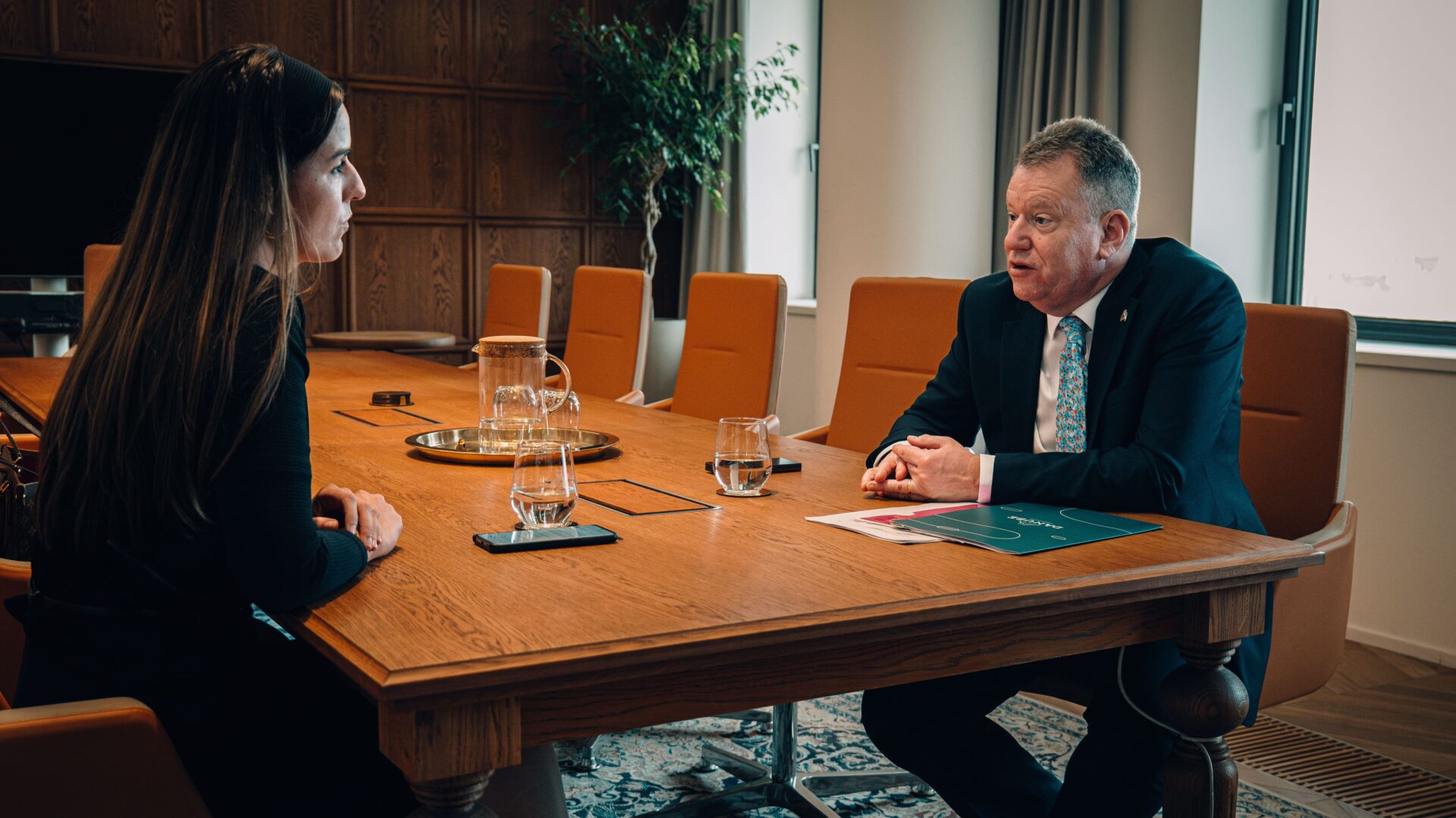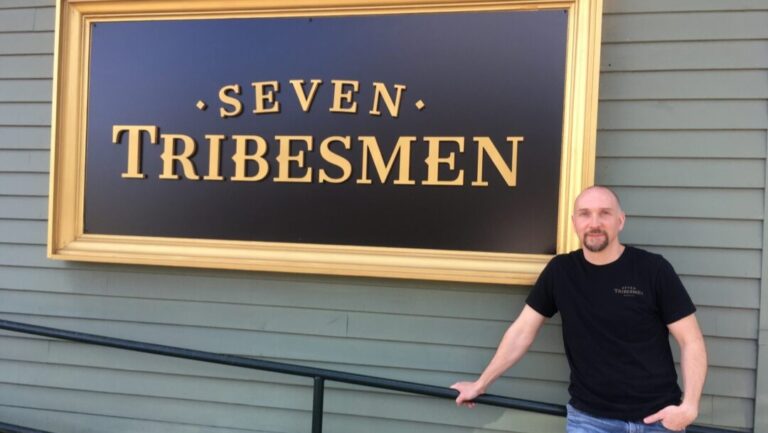‘A large number of British people still want traditional conservative policies: people who believe in the traditional virtues of conservatism and economic and social cohesion, and who want a party that delivers them. Our political task is, therefore, clear: we must regain the trust of our voters’, Lord David Frost told Hungarian Conservative. In this interview, the UK’s former Chief Brexit negotiator and former political advisor of Boris Johnson emphasized that there are definitely things British Conservatives can learn from the Hungarian government, for example, in handling migration, building social cohesion, or managing the demographic crisis and family policy.
***
From the title of your lecture at the Danube Institute (‘The Right Track: Has British Conservatism Lost its Way?’) it is already clear that British conservatism is in search of a way, and public opinion polls do not promise much good either. What has led to this? What are the reasons behind the conservatives losing their way and what can be done about it?
The answer to this question can be approached from many angles, but I think that it is fundamentally about the fact that the Conservative Party has got out of touch with its own voters over this period. So now we have to face the problem that about two-thirds of the people who voted for us in 2019 now say that they do not intend to vote for us. This does not mean that they will all cast their vote for another party instead of us—they just do not want to vote for us. Our political task is, therefore, clear: we must regain the trust of our voters. And I think the way to do that is to pursue more conservative politics. Unfortunately, the problem for many of our voters is that when they look at previous promises, they see that legal and illegal immigration, for example, is still very high. In addition, they see high energy prices and a net zero policy that they don’t particularly like, and they see the highest levels of taxation and spending since the Second World War. And they ask: why is this happening under a Conservative government? And since we can’t give satisfactory answers at the moment, why would they vote for us? That’s the crux of the problem: we’re not delivering conservative enough answers.
What do you expect from the UK general election later this year? Can the conservatives kick the ball?
At the moment, we’re heading to a very serious defeat. This is also obvious from the fact that the opinion polls have never shown our popularity as low as it is now. So we have to do something about that if we’re going to have any chance, and it will not be easy. Still, I believe that a serious attempt to reduce taxes and spending, and serious action against illegal and legal migration are needed—and naturally, we have to respond to the other problems that concern voters. Of course, these problems cannot be solved in six months, but forward-looking steps can be taken in that short time and a plan set out. Unless and until we do that, I fear we will lose the election.
By the way,
illegal migration has become one of the most important issues for voters: it’s a sort of symbol of what’s gone wrong.
It looks like a problem that the government ought to be able to stop but it isn’t doing so, so it symbolizes all the concerns people have about the weakness of state authority and its inability to get a grip on problems. Moreover, given that we’re an island, people tend to think that’s an advantage in keeping people out. In fact, it makes things more difficult in the case of illegal migration by small boat in the Channel. Immigration policy is now probably the biggest issue for our potential voters and it is one that has taken us further away from our conservative roots.

You were the United Kingdom’s Chief Negotiator for Exiting the European Union during the Brexit negotiations. Do you think Brexit has contributed to the crisis in the Conservative Party?
The current situation reveals a pre-existing crisis that has developed over the last twenty years. Over that time, and more specifically, the traditional centre of gravity of the Party, that is, social conservatism and its emphasis on the nation and the welfare of the nation, has been gradually diluted by a kind of liberal progressive conservatism. This had happened long before Brexit. What happened was that Brexit highlighted the division, because the traditional conservatives were generally happy with leaving the EU, and the progressive wing was generally not. And this caused the internal arguments that are still around us today.
And what is the Conservative Party’s response to the fact that traditional conservative values have been replaced by a progressive ideology, not only in the United Kingdom but around the world?
The gradual replacement of classically Western values with post-modernist ‘woke’ thought is familiar worldwide, a process which has dramatically accelerated in the last ten years, and one with which you in Hungary are extremely familiar. The roots of the problem are now very deep, and we may be particularly affected as an English-speaking country with strong influence from America. Our party has been slow to spot the significance of this movement, but I think it is now alive to it and is beginning to take steps against it. Recently, for example, we banned puberty blockers, which are hormone therapy treatments that delay the sexual development changes of puberty. But I certainly think more needs to be done. If you are receiving public money, you shouldn’t be advocating these sorts of extreme progressive ideologies. The Labour Party will obviously take a different stance if we Conservatives lose the election, and then
we can expect even more progressive ideology in public institutions.
We need to do more before the election comes to show the British people that we are on their side and the side of common sense.

It is felt that there is a certain level of apathy among conservative voters. What is the party doing to regain their trust?
There is certainly a degree of apathy, and that’s a pity, because the Brexit referendum provided a great opportunity for change. People felt that it made sense then to go to vote because they had a chance to really change something. In 2019 too, thanks to them, we won a big election majority, and there was certainly a high degree of enthusiasm that now everything would be different. Sadly, we have largely wasted that opportunity. The failure to get to grips with these problems is why so many Brits say ‘the Tories have been in power for fourteen years and have achieved nothing’. That is understandable and we need to persuade voters we can do something better. The voters don’t want the government just to sit there and administer the country;
they want us actually to do something and change things, not just sit back in the armchair.
Hungary has had a conservative government for fourteen years, and according to opinion polls, they seem to have no reason to worry about voter support. Can the British conservatives learn something from the Hungarians?
I am a qualified admirer of what has been done in Hungary over the last decade and a half. We can learn a lot from the fairly uncompromising attitude of the Hungarian government on issues such as state authority and the nation. I would also mention the handling of migration and the fact that the Hungarian government just didn’t care what others think in this matter: they just focused on protecting their borders. Then there is the building of social cohesion, the management of demographic problems, family policy, and I could list more. So I think we can learn a lot from connecting with the social currents that engage voters and giving people what they want. Of course, there are areas where I would be more critical: for example, while I understand what the Hungarian government thinks and is trying to do concerning Ukraine, I don’t really agree with it. So there are disagreements, but there are definitely things we can learn too.
One of the Danube Institute’s little birds told us that you had read Balázs Orbán’s book Hussar Cut. Did you find any useful advice in it that you think is worth keeping in mind?
It was an excellent book and very interesting. I think it is worth thinking about the emphasis he places on connectivity and the very clear perception of where Hungary’s strategic interest lies: according to the book, increasing connectivity instead of decoupling and returning to bloc politics. We can certainly learn from the emphasis he puts on winning friends around the world: the West should have learned from the Ukraine war that too many of our friends did not support Western positions on it when we thought they ought to have done so. And this can be traced back to the fact that in many parts of the world we have not invested enough energy in cultivating relationships and explaining our points of view. But of course, I don’t agree with everything in the book and I don’t think it is possible or right for a country like Hungary to get too far from its Western friends and allies.
Do you still follow EU politics?
I do but not in the same way. Today, for example, I almost completely forgot that there is an EU summit, while a few years ago, my life was organized around these summits. The British are aware of the so-called populist wave in Europe. I don’t know how strong it will turn out to be, but I would urge caution about what can be achieved, because I have found that it is very difficult to deflect the ideologically driven bureaucrats in Brussels from their strategies of closer integration. Stronger right-wing parties may be able to achieve some tactical victories if they are stronger in the European Parliament, but it will not change the basic worldview and direction of the EU institutions. This is why we finally had to leave: we simply could not accommodate the differing perspectives and the continued intrusion into our national life.








